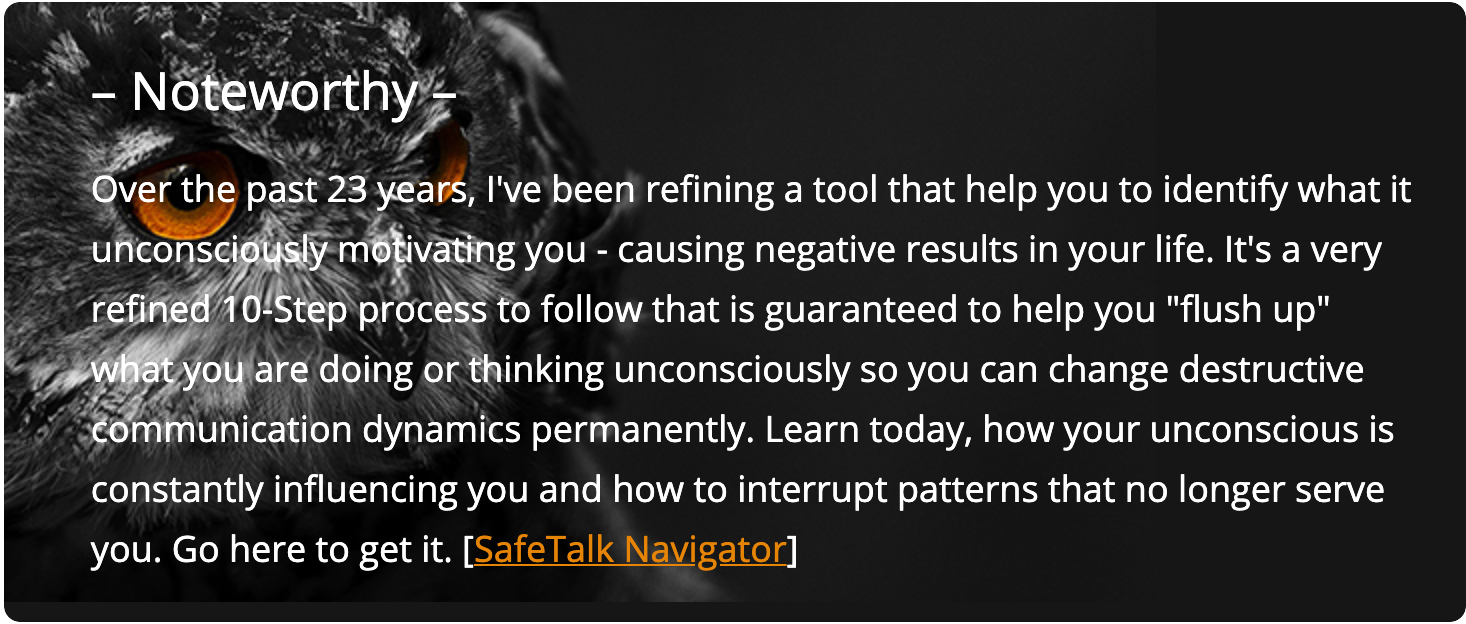Couples Effective Listening Skills
Today, I'm going to talk about effective listening skills. I want to give you a couple of tips that you can use for the rest of your life. In particular, we will talk about listening filters. Listening Filters are one of the most essential communication skills you can learn.
You will especially benefit if you are in a fresh relationship or have been in a relationship for a long time.
This is especially helpful for men. Here's what the tip is.
Effective Listening Skills Build Trust...
Listening is your gateway to building trust in a relationship. The way you listen was programmed into you as soon as you were born. It started when you started connecting with people around you.
Without realizing it, you adopted others patterns or developed your own listening model by pure instincts to guarantee your survival. In other words, your listening skills and the listening filters you use to listen with or your approach to listening is a byproduct of your environment.
Now, the reason this is so significant is there could have been different things going on in the home outside of our ability to be aware of them. In different words, you adopted patterns with a limited viewpoint. Now that you are older and smarter you can learn to listen in any way you would like.
We Develop Listening Patterns Based On a Limited Perspective...
If there was ease and flow in your home growing up you will listen differently than someone who experienced a lot of chaos. The filter you listen with directly correlates to the quality of how well you regulate your nervous system. You see, in the early years, all of your experiences are literally training your nervous system to regulate.
If your primary caretaker knew what you needed when you were stressed and consistently helped calm you down when worried, you developed a nervous system that regulates well. It probably defaults too, "Things will be ok" and automatically calms you down because of habituated patterning. You will also tend to make better assumptions later in life when others don't.
If however, your primary caretaker didn't understand what you needed and was unskilled at calming you down, then your tendency to feel insecure when stress rises dramatically increases – until you repair it. In my coaching practice, I use a process called Somatic Experiencing to assist my clients in repairing to "default" response.
Frequently, when we're little kids, parents can be preoccupied. Maybe they had other children to tend too. Maybe they had taxing jobs. Maybe the father was going through a hard time losing a career job. Maybe the mother was sick. The bottom line was, the parent was preoccupied and they couldn't give you the attention that you needed during your most impressionable years.
All of these scenarios, can create an anxious nervous system later in life. If there is a lot of chaos or unskilled parenting around calming you down when you were stressed, you'll instinctually use coping patterns to calm yourselves down. These coping patterns can show up as wonky behavior later in life.
If you are newly dating someone, you'll recognize them as:
- Neediness
- Distancing behaviors
- Arguments over little things
- Clinginess
- Anxious behaviors if you don't respond in timely manner
Common Ineffective Listening Patterns...
In summary, within the first five to seven years of life we have patterns that we take on that become habituated. These habits are going on all the time while communicating with people. They become unconscious patterns that are motivating us outside of out awareness. Here are some common destructive listening patterns to watch for:
- Listening to "jump in to talk"
- Listening to "fix"
- Listening to be "critical or judgmental"
- Listening to be "right" or "prove you are wrong"
- Listening to "one up you"
To repair them, we need a method to identify them. The question is: How do we see them?
How To Identify Ineffective Listening Patterns...
As you probably already know, it's easy for others to see our blindspots. Like a fish, we can't see the water we’re swimming in. So it's really significant that you have some skills. An excellent skill it being able to identify ineffective listening patterns you adopted early in life.
Here is the fastest way I know.
To become more aware of your listening filter patterns start by looking at the result you are getting. If you are getting a less than desirable result then just assume you are contributing to that outcome in some way.
A pattern I've developed over the years is to pay attention to what I am doing with information someone is sharing. When I'm talking to someone, I'm secretly watching how I begin thinking about what they are saying. I look for things like, "Am I judging them?" or "Am I finding fault with their method?" or "Am I reacting to them somehow?" or "Am I interrupting them a lot?"
Each of these questions allows me to develop self awareness of my innate patterns I adopted first in life. Once you see them you can decide if you want to change your internal direction in the conversation. Effective listening skills don't always come easy but they are the bedrock of healthy communication so it is worth sorting it out early in life.
If you want to build trust, follow these directions.
Instead of jumping in or giving advice or some of the patterns we mentioned, do this instead:
What I want you to do is:
- listen for the need or
- listen for what the person values or
- listen to what is this person sorting out in their life
What I also find helpful is to go into any conversation with a couple things in mind.
First, check in with yourself to see if you are available to listen and not already triggered or pre-occupied in some way. Before any conversation, I check in to make sure I'm available.
Second, I'd encourage you to see everyone you meet as capable. Capable of working out issues in their life.
The assumption to make here is that if they want help they will ask for it. Even if they ask, do not always give an answer if you can tell they are disempowering themselves.
In lieu of, ask them empowering questions. For example, "If you were to guess the right direction, what do you think you would choose?" or "What do you think you should do next?" This way, your supporting their own resourcefulness which builds higher self-worth and confidence.
Chances are, if they are struggling in the first place, they are lacking confidence in themselves to trust it's ok to make mistakes and learn from whatever choice they make.
You can add, “You know I'm really looking forward to hearing how that turns out for you. I'm excited because you sound like you're on the right track.”
If you feel like they've been shooting themselves in the foot over-and-over again, you can communicate "I have some ideas if you're ever interested." But don't be attached to them to saying yes or no. Most of the time they'll want to know.
Wait until they give you permission to share in that conversation. Don't do it before then. Otherwise, you have fallen into giving advice for the wrong reasons.
Hopefully, that's helpful. Effective Listening skills is a really great trust builder.
Effective Listening is only the tip of the iceberg...
If you found value in this article, please take a moment and select the like button to the left and share this post. If you or you know someone who could use some communication skills support please click on the Book Now tab on the right side of this page. You can get a FREE 30-minute session to see how powerful my coaching style is to decide if it's worth the investment.
And here is another free gift...

– Noteworthy –
Over the past 23 years, I've been refining a tool that help you to identify what it unconsciously motivating you - causing negative results in your life. It's a very refined 10-Step process to follow that is guaranteed to help you "flush up" what you are doing or thinking unconsciously so you can change destructive communication dynamics permanently. Learn today, how your unconscious is constantly influencing you and how to interrupt patterns that no longer serve you. Go here to get it. [SafeTalk Navigator]
And then, most importantly, take time to write your questions below describing your most important communication challenges or challenges you see in others. Feel free to describe what happens in the real world for the challenge you are sharing.
If you haven't been in a relationship for a while, pick something that has repeated itself in previous relationships.
Thanks again, see you in the next article.

